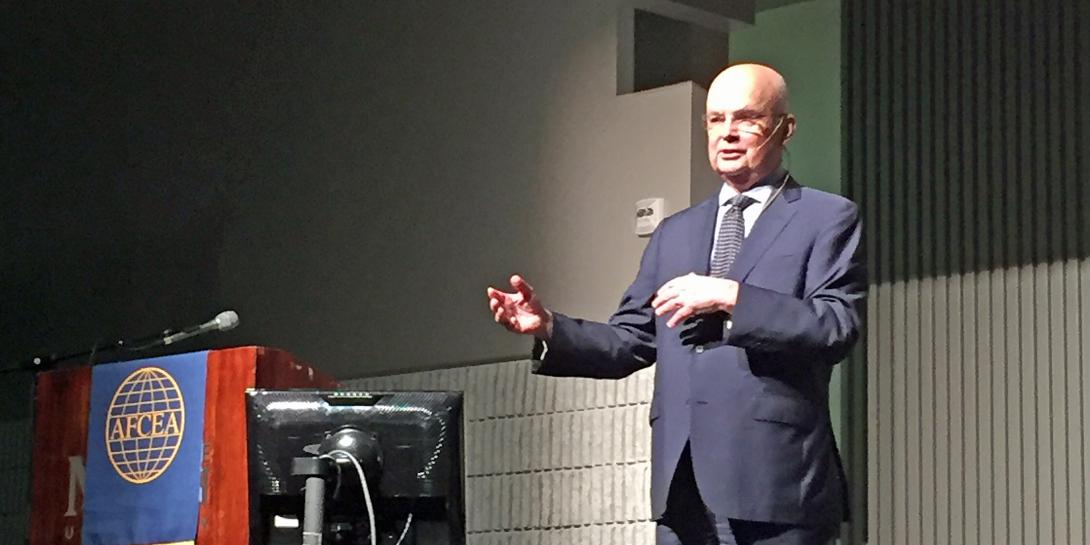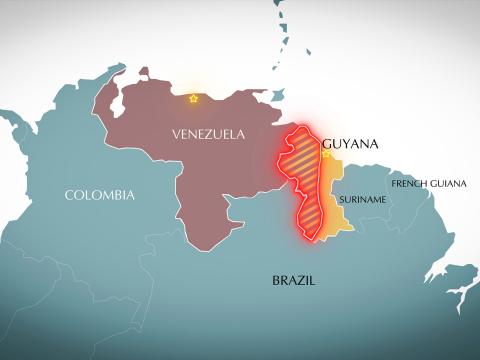Living in a Post-Truth World
Gen. Michael Hayden, USAF (Ret.), principal, the Chertoff Group, shifted the weight of the conversation at the AFCEA/GMU Critical Issues in C4I Symposium from the direction of cyber narrowly defined to information broadly defined. Throughout his morning keynote he touched on Russian manipulation of the 2016 election, the U.S. moving into a post-truth culture and what cyber leaders can do in the future to help secure the nation.
The former director of the National Security Agency and the CIA related that though the United States’ scope of vision is on cyber dominance, the Russians are focused on information dominance. Gen. Hayden paraphrased Atlantic writer Peter Pomerantsev to help describe Russia’s goal as “contactless warfare using informational means to affect the population of the target country.”
“I think we are doctrinally in cyber and it’s hard for us to respond to the Russians because our vision of what it is we do is broadly limited, constrained and bookended by our cyber dominance point of view,” Gen. Hayden said.
The general became apprised of the “information dominance bubble” while writing his book The Assault on Intelligence: American National Security in an Age of Lies. During his research he talked with Clint Watts, senior fellow at the Center for Cyber and Homeland Security at George Washington University and a Foreign Policy Research Institute fellow. While Watts was working on a project to counter ISIS use on the web, he noticed a second community of “botnets” sympathizing with ISIS, which turned out to be the Russians.
“The Russians had taken their own active measures campaign and fast forwarded it into virtual space and social media,” said Gen. Hayden. “What we had here was a Russian-facing, Russian-controlled network that in its spare time was stirring [the ISIS] pot.”
The longer Watts looked at it, the more it was outward facing toward the West, including inside the United States.
“Russia is not a resurgent power. Russia is a remonstrate power,” stated the general. The gross domestic product of Russia is roughly only two thirds of the state of California. “Putin knows he has a weak hand, but he’s playing it very aggressively.”
Gen. Hayden shared a cartoon he envisions of Russian President Vladimir Putin sitting at the kids table, while the rest of the world sits at the adults table. Each night Putin slices off about three quarters of an inch from the adults table, so that one night his chair fits there. It’s his “Scooby-Doo approach to geopolitics.” The general thinks the cartoon captures Russia’s effort, not to try to match us but to pull us down to their level. “It explains Russia putting more fuel on the fire of Brexit, Russians attacking NATO, social media space, the EU and democratic processes inside the United States, which they did in the 2016 election,” he said.
Ironically, it all begins in the cyber domain with the cyber theft of emails from the Democratic National Committee and John Podesta, states Gen. Hayden. “The theft of the emails was actually honorable international espionage, legitimate state-on-state activity. That’s not the new news. The new news is taking that data, bringing it back over here, weaponizing it and shoving it back into our informational space through WikiLeaks.”
The intelligence community assessment, “Assessing Russian Activities and Intentions in Recent US Elections” published in January 2017 showed the Russians did it, it was very sophisticated, done on a scale the U.S. has not seen before and was personally approved by Putin, said Gen. Hayden. Its objectives were “the messing with our heads, punishing of Hillary Clinton, delegitimizing the Clinton administration, and later, with the realization that Trump could win, pushing votes in his direction,” he said.
Though the general points out the Russians did not affect the actual mechanics of voting, “they touched some of those networks and undercut our confidence in the systems and processes. They didn’t actually corrupt votes, they just made us think that they had,” the general said.
“If the U.S were doing it, we’d call it a covert influence campaign,” Gen. Hayden related. The idea of a successful covert influence campaigns is to identify preexisting fractures in the target country and then exploit those fractures to drive the population further apart.
“The Russians do not have to create themes. They grab them from our own political discourse,” he said. “It’s already in the American vernacular.”
The fracture lies in society moving into a post-truth culture, Gen. Hayden stated. The Oxford Dictionary word of the year in 2016, post-truth is described as decision-making based less on evidence and data and more on feeling, emotion, preference, loyalty, tribe or grievance.
“The long-term solution is to heal ourselves and heal our current dialog,” stated the general.
But what else can cyber and defense professionals do? Gen. Hayden thinks there’s no reason Internet political advertising shouldn’t be as controlled and regulated as political advertising in broadcast media. He also believes the U.S. has the technology that can determine, to a sufficient degree of certainty, when someone is talking to a human being and not a manipulation created by a botnet. “We might be able to suppress some of the artificial stimulation of our own dialog just through the application of technology,” said Gen. Hayden.
The other reality is that most people get their news on Facebook. And the problem with that is that by-and-large it is uncurated news. It’s hard for the average user to discriminate among different sources of information. Gen. Hayden suggested the creation of a “Rotten Tomatoes” for news sites, which gives news sites ratings based on users’ experiences.
Another technical effort the U.S. can take to guard against information manipulation is changing the algorithm on Facebook so that it isn’t just showing users what they like. Facebook identifies your previous preferences. “The longer you stay, the more it bends you in the direction of information sources that agree, maybe even more strongly, with your going-in position,” the general said. “We are perhaps becoming more radicalized because of this algorithm. The technology has gotten ahead of our social norms,” Gen. Hayden said.
Gen. Hayden sees similarities with Russia and the terrorist attacks on September 11 in that it was “an attack from an unexpected source against a previously unknown weakness.” Unlike the response after 9/11 though, he fears that unless the President is on board, “we will not fix this in a way that it needs to be fixed.”





Comments